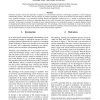Free Online Productivity Tools
i2Speak
i2Symbol
i2OCR
iTex2Img
iWeb2Print
iWeb2Shot
i2Type
iPdf2Split
iPdf2Merge
i2Bopomofo
i2Arabic
i2Style
i2Image
i2PDF
iLatex2Rtf
Sci2ools
110
click to vote
LREC
2008
2008
A Semantic Memory for Incremental Ontology Population
Generally, ontology learning and population is applied as a semi-automatic approach to knowledge acquisition in natural language understanding systems. That means, after the ontology is created or populated, an expert of the domain can still change or refine the newly acquired knowledge. In an incremental ontology learning and population framework (as e.g. applied in open-domain dialog systems) this approach is not sufficient as knowledge about the real world is dynamic and, therefore, has to be acquired and updated constantly. In this paper we propose the storing of newly acquired instances of an ontological concept in a separate database instead of integrating them directly into the system's knowledge base. The advantage is that incorrect knowledge is not part of the internal knowledge representation but stored aside. Furthermore, information about the confidence of the learned instances can be displayed and used for a final revision by an expert as well as for a further fully ...
| Added | 29 Oct 2010 |
| Updated | 29 Oct 2010 |
| Type | Conference |
| Year | 2008 |
| Where | LREC |
| Authors | Berenike Loos, Lasse Schwarten |
Comments (0)

